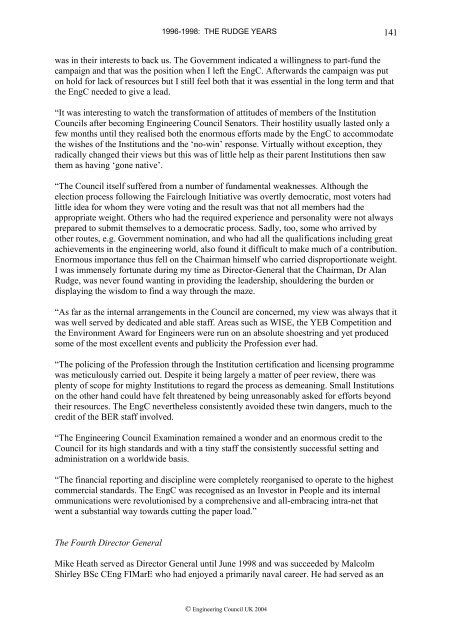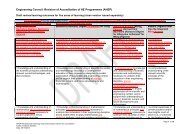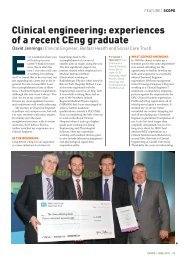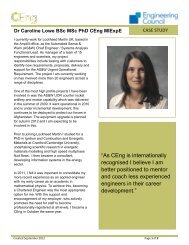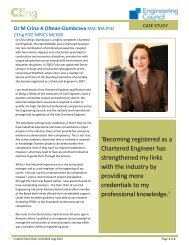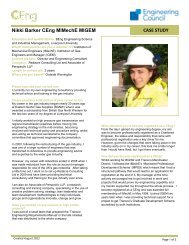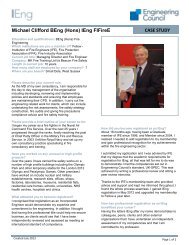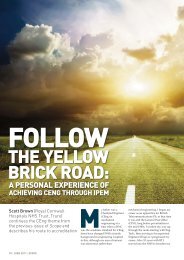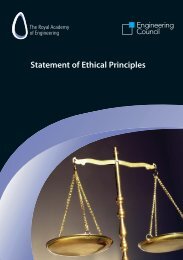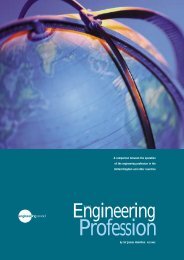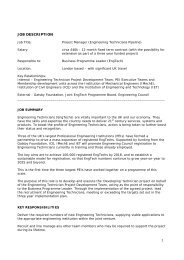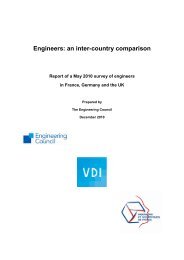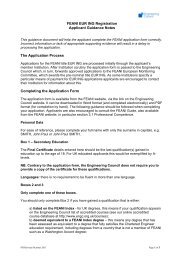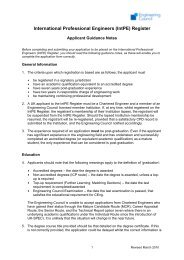An Engine for Change - A Chronicle of the Engineering Council
An Engine for Change - A Chronicle of the Engineering Council
An Engine for Change - A Chronicle of the Engineering Council
You also want an ePaper? Increase the reach of your titles
YUMPU automatically turns print PDFs into web optimized ePapers that Google loves.
1996-1998: THE RUDGE YEARS 141was in <strong>the</strong>ir interests to back us. The Government indicated a willingness to part-fund <strong>the</strong>campaign and that was <strong>the</strong> position when I left <strong>the</strong> EngC. Afterwards <strong>the</strong> campaign was puton hold <strong>for</strong> lack <strong>of</strong> resources but I still feel both that it was essential in <strong>the</strong> long term and that<strong>the</strong> EngC needed to give a lead.“It was interesting to watch <strong>the</strong> trans<strong>for</strong>mation <strong>of</strong> attitudes <strong>of</strong> members <strong>of</strong> <strong>the</strong> Institution<strong>Council</strong>s after becoming <strong>Engine</strong>ering <strong>Council</strong> Senators. Their hostility usually lasted only afew months until <strong>the</strong>y realised both <strong>the</strong> enormous ef<strong>for</strong>ts made by <strong>the</strong> EngC to accommodate<strong>the</strong> wishes <strong>of</strong> <strong>the</strong> Institutions and <strong>the</strong> ‘no-win’ response. Virtually without exception, <strong>the</strong>yradically changed <strong>the</strong>ir views but this was <strong>of</strong> little help as <strong>the</strong>ir parent Institutions <strong>the</strong>n saw<strong>the</strong>m as having ‘gone native’.“The <strong>Council</strong> itself suffered from a number <strong>of</strong> fundamental weaknesses. Although <strong>the</strong>election process following <strong>the</strong> Fairclough Initiative was overtly democratic, most voters hadlittle idea <strong>for</strong> whom <strong>the</strong>y were voting and <strong>the</strong> result was that not all members had <strong>the</strong>appropriate weight. O<strong>the</strong>rs who had <strong>the</strong> required experience and personality were not alwaysprepared to submit <strong>the</strong>mselves to a democratic process. Sadly, too, some who arrived byo<strong>the</strong>r routes, e.g. Government nomination, and who had all <strong>the</strong> qualifications including greatachievements in <strong>the</strong> engineering world, also found it difficult to make much <strong>of</strong> a contribution.Enormous importance thus fell on <strong>the</strong> Chairman himself who carried disproportionate weight.I was immensely <strong>for</strong>tunate during my time as Director-General that <strong>the</strong> Chairman, Dr AlanRudge, was never found wanting in providing <strong>the</strong> leadership, shouldering <strong>the</strong> burden ordisplaying <strong>the</strong> wisdom to find a way through <strong>the</strong> maze.“As far as <strong>the</strong> internal arrangements in <strong>the</strong> <strong>Council</strong> are concerned, my view was always that itwas well served by dedicated and able staff. Areas such as WISE, <strong>the</strong> YEB Competition and<strong>the</strong> Environment Award <strong>for</strong> <strong>Engine</strong>ers were run on an absolute shoestring and yet producedsome <strong>of</strong> <strong>the</strong> most excellent events and publicity <strong>the</strong> Pr<strong>of</strong>ession ever had.“The policing <strong>of</strong> <strong>the</strong> Pr<strong>of</strong>ession through <strong>the</strong> Institution certification and licensing programmewas meticulously carried out. Despite it being largely a matter <strong>of</strong> peer review, <strong>the</strong>re wasplenty <strong>of</strong> scope <strong>for</strong> mighty Institutions to regard <strong>the</strong> process as demeaning. Small Institutionson <strong>the</strong> o<strong>the</strong>r hand could have felt threatened by being unreasonably asked <strong>for</strong> ef<strong>for</strong>ts beyond<strong>the</strong>ir resources. The EngC never<strong>the</strong>less consistently avoided <strong>the</strong>se twin dangers, much to <strong>the</strong>credit <strong>of</strong> <strong>the</strong> BER staff involved.“The <strong>Engine</strong>ering <strong>Council</strong> Examination remained a wonder and an enormous credit to <strong>the</strong><strong>Council</strong> <strong>for</strong> its high standards and with a tiny staff <strong>the</strong> consistently successful setting andadministration on a worldwide basis.“The financial reporting and discipline were completely reorganised to operate to <strong>the</strong> highestcommercial standards. The EngC was recognised as an Investor in People and its internalommunications were revolutionised by a comprehensive and all-embracing intra-net thatwent a substantial way towards cutting <strong>the</strong> paper load.”The Fourth Director GeneralMike Heath served as Director General until June 1998 and was succeeded by MalcolmShirley BSc CEng FIMarE who had enjoyed a primarily naval career. He had served as an© <strong>Engine</strong>ering <strong>Council</strong> UK 2004


